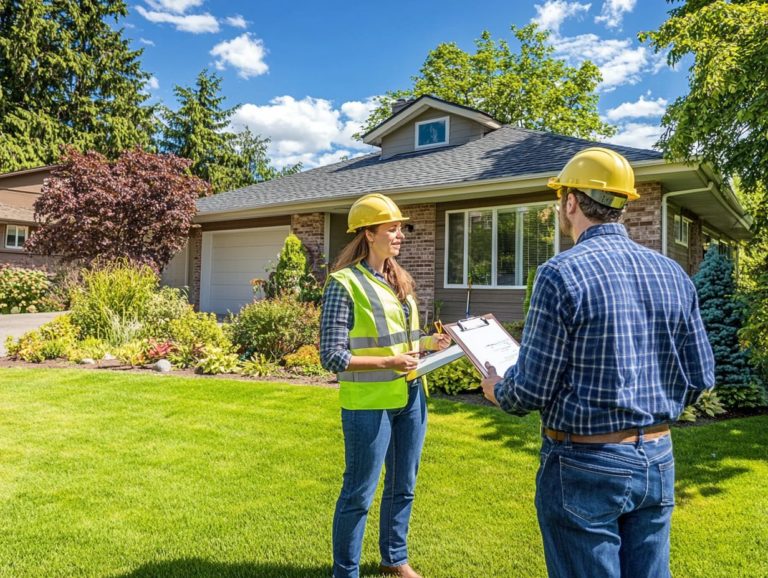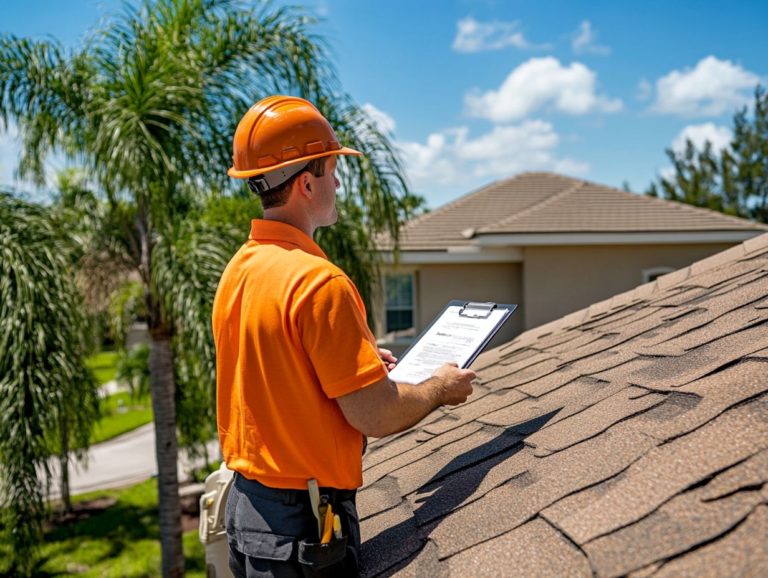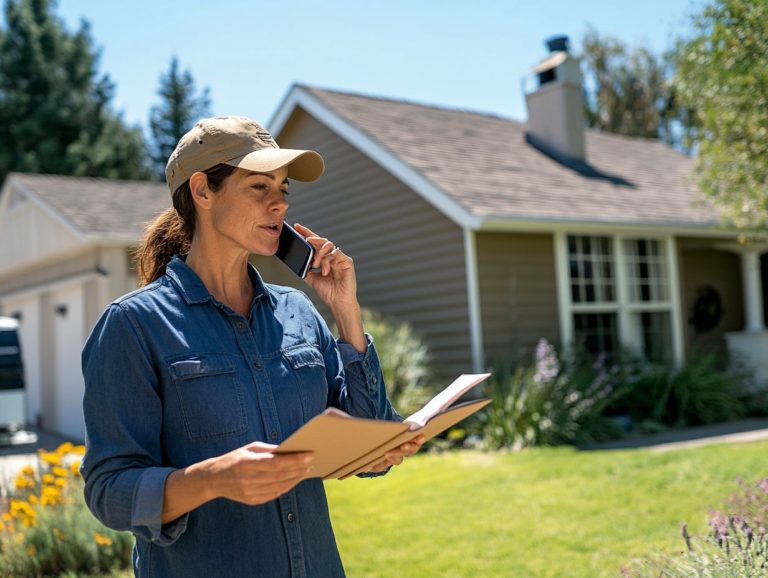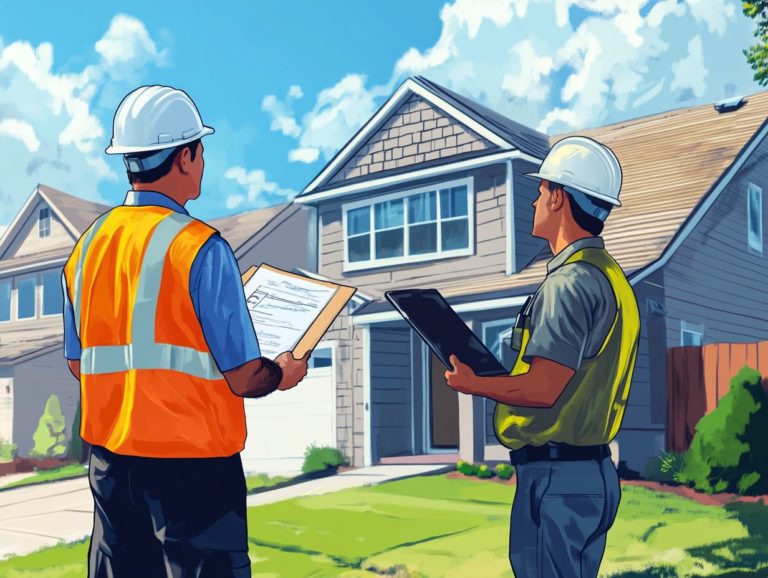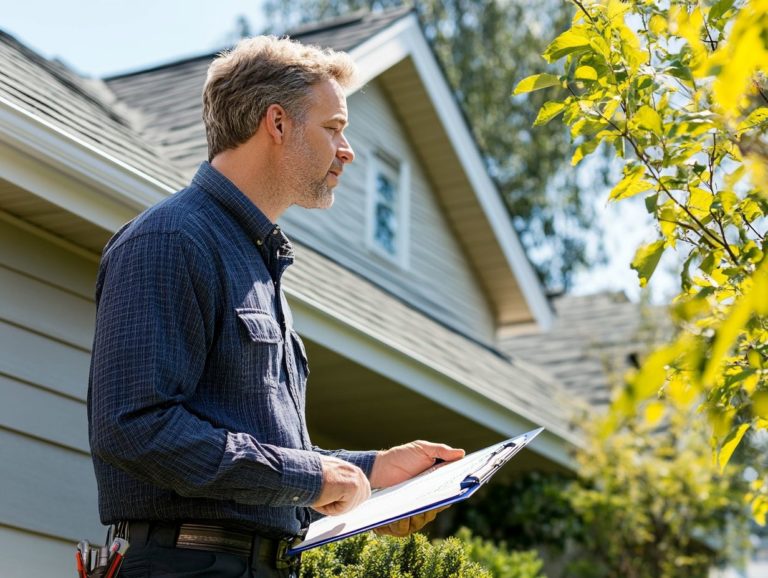Understanding Home Inspection Fees
When you re buying or selling a home, grasping the complexities of home inspections is crucial. This guide will help you understand the definition and purpose of a home inspection, the factors that influence inspection fees, and what you can expect throughout the process.
You ll discover how to select the right home inspector, understand average costs, and negotiate fees with confidence. Whether you re a first-time homebuyer or a seasoned seller, this overview will empower you with the knowledge needed to navigate home inspections with ease.
Contents
Key Takeaways:

Home inspection fees are influenced by various factors such as the size and age of the property, as well as its location and accessibility.
Understanding the standard inclusions and potential additional services and costs of a home inspection can help you budget and choose the right inspector.
When negotiating home inspection fees, be sure to ask about the inspector’s qualifications and experience. Don’t be afraid to ask for references or recommendations.
What is a Home Inspection?
A home inspection is an essential evaluation of a property’s condition, typically carried out by a certified home inspector. This detailed process is an important step for you as a homebuyer during real estate transactions.
It encompasses a thorough assessment of various systems, including heating, ventilation, and air conditioning (HVAC), plumbing, and electrical components. It also identifies potential safety hazards, structural concerns, or hidden costs that may affect the property’s value.
Ultimately, this inspection offers you crucial insights into your financial investment, giving you the knowledge necessary to negotiate effectively.
Definition and Purpose
The primary purpose of a home inspection is to provide you with a detailed evaluation of a property’s condition, ensuring that you’re well-informed before making a significant financial investment. This comprehensive process includes a thorough examination of the property’s structural integrity, electrical systems, plumbing, and various other critical components that could impact safety and livability.
By identifying potential issues early on, the inspection protects your finances and strengthens your negotiating position. Armed with a clearer understanding of what needs repair or replacement, you can make informed decisions about offers, requests for repairs, or price adjustments, ultimately leading to a more favorable deal.
In essence, the home inspection serves as a crucial step, reinforcing your confidence in this important investment.
Factors that Affect Home Inspection Fees
Home inspection fees are influenced by a variety of factors, including the pricing model chosen by inspectors whether they opt for a flat rate or location-based pricing. Key considerations involve the property’s size, age, and overall condition. Inspectors often adjust their fees to remain competitive within their service area, striking a balance between appealing to homebuyers and accounting for the square footage of the property under evaluation.
Grasping these elements is crucial for both buyers and sellers, giving them the ability to navigate real estate transactions with confidence and precision.
Size and Age of Home
The size and age of a home play a crucial role in determining the fees associated with a home inspection. Larger properties often necessitate more extensive evaluations, while older homes may require in-depth assessments to uncover potential issues, such as foundation problems.
These factors lead to a range of pricing models used by inspectors, typically considering square footage and the home’s historical complexities. For example, you might find that a smaller, newer property costs around $300 for an inspection, whereas a larger, aging residence could see fees soaring to $600 or more.
This relationship not only influences the cost but also affects the overall timeline for the inspection process. Inspectors may need extra time to thoroughly evaluate critical systems in older homes, like plumbing and electrical wiring. Therefore, it s essential for homeowners to budget not just financially, but also in terms of scheduling, to accommodate a comprehensive inspection.
Location and Accessibility

Location significantly influences home inspection fees. Inspectors often adjust their pricing based on the property’s location to cover travel costs and accessibility.
If a property is in a remote or hard-to-reach area, the inspection costs are typically higher due to the extra time and resources needed for travel. On the flip side, homes in urban areas, where inspectors can conveniently visit multiple properties in one trip, often enjoy lower inspection fees.
This geographical variability not only affects pricing but also impacts how quickly inspections can be scheduled. In regions with high housing density, you might find a more competitive market, allowing for easier scheduling and potentially reduced costs for both buyers and sellers.
Understanding the effects of location on home inspection expenses is crucial for anyone navigating the real estate landscape.
What is Included in a Home Inspection?
A thorough home inspection offers you a meticulous evaluation of the property’s major systems, including heating, ventilation, and air conditioning system (HVAC), plumbing, and electrical systems.
This process culminates in a detailed report that outlines the inspection findings, highlighting existing conditions and potential issues.
Typically, the assessment includes:
- Structural evaluations
- Identification of safety hazards
- Additional services such as radon testing and termite inspections
These elements ensure a complete understanding of the property s overall health.
Standard Inclusions
Standard inclusions in a home inspection typically cover evaluations of essential property systems, such as HVAC, plumbing, and electrical systems. Understanding the condition of these systems is vital for grasping the overall health of the home.
These assessments offer invaluable insights into how efficiently each system operates and highlight potential deficiencies. This ensures you are fully informed before making any decisions.
For instance, when the HVAC system is evaluated, the inspector checks not just for functionality but also how efficiently the heating and cooling processes work. Factors like these can significantly influence your energy costs.
Similarly, plumbing inspections delve into the integrity of pipes and fixtures. Inspectors search for leaks or signs of water damage that could result in expensive repairs down the line.
An examination of the electrical system ensures compliance with safety standards, helping to avoid fire hazards linked to outdated or faulty wiring.
Each of these evaluations comes together to create a comprehensive inspection report, giving you the power to make educated decisions about your property.
Additional Services and Costs
Many home inspectors offer valuable services like radon testing and termite inspections. While these may come with extra costs, they provide critical insights into potential hidden hazards.
These supplementary assessments can greatly enhance the overall value of the inspection process for you as a prospective buyer. They illuminate issues that may not be immediately visible.
For example, radon a colorless, odorless gas poses serious health risks. Yet, it s often overlooked by buyers in their new homes.
Similarly, a termite infestation can lead to significant damage, frequently hidden behind walls or beneath floors, which can be costly to remediate.
By choosing these additional services, you not only protect your investment but also gain peace of mind. This ensures that your new property is both structurally sound and healthy to inhabit.
Ultimately, that small investment in advanced inspections can save you from unexpected future expenses. This makes it a wise choice in your home-buying journey.
How to Choose a Home Inspector
Choosing the right home inspector is essential for a comprehensive evaluation. You should consider factors like the inspector s qualifications, level of experience, and the overall customer experience they offer.
Taking the time to read reviews and seek recommendations can greatly increase your chances of finding a trusted professional who upholds industry standards and practices.
Don t risk costly surprises schedule your home inspection today!
Qualifications and Experience

When choosing a home inspector, qualifications and experience are crucial. They directly affect the quality of the inspection and adherence to industry standards.
Look for inspectors certified by reputable organizations like ASHI, NACHI, or NAHI. These credentials indicate solid theoretical knowledge and practical skills.
A certified home inspector has undergone rigorous training and continues their education. This ensures they stay updated with the latest industry standards and techniques.
Experience in inspecting various properties helps them identify critical issues that others might miss.
Reviews and Recommendations
Reviews and recommendations are essential when selecting a home inspector. They provide insights into the inspector’s reliability and thoroughness.
Testimonials from previous clients offer a clearer view of an inspector’s strengths and weaknesses. Recommendations from trusted friends or real estate professionals can also enhance your evaluation.
This information helps you assess the inspector’s attention to detail and ability to communicate findings.
With positive reviews and credible endorsements, you can approach your home-buying journey with confidence. This preparation can save you time and money.
Understanding the Costs of a Home Inspection
Understanding home inspection costs is vital for buyers. Average fees can vary significantly based on property size, location, and market conditions, making it important to explore understanding home inspection fees.
This knowledge helps you budget wisely and avoid unexpected financial surprises during the inspection.
Average Fees and What They Cover
Home inspection fees usually range from $300 to $500. This covers a thorough examination of the property’s major systems and structural components.
Inspectors assess critical elements like the roof, electrical systems, plumbing, HVAC (Heating, Ventilation, and Air Conditioning), and foundation. Many inspections also check for pests, mold, and general wear and tear.
These assessments give you a clear understanding of your investment’s current condition. They also highlight potential future issues that could incur additional costs.
A detailed inspection empowers you to make informed decisions and negotiate repairs or price adjustments before closing the deal.
Tips for Negotiating Home Inspection Fees
Negotiating home inspection fees enhances your leverage as a buyer. Knowing what questions to ask is crucial during this process.
Understanding typical costs and inspection components allows you to make strategic decisions. This knowledge may help you lower the fees.
What to Ask and What to Expect
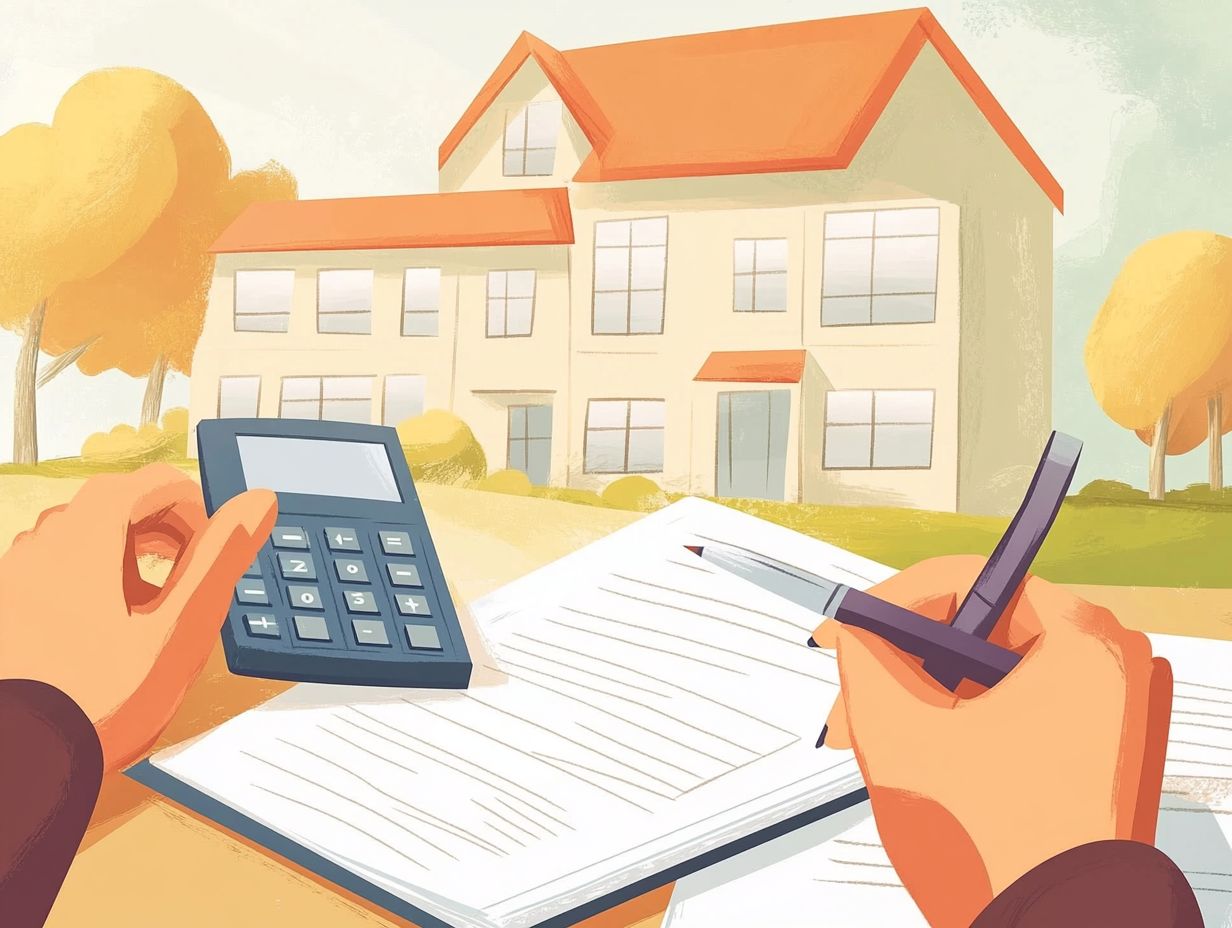
When negotiating home inspection fees, it s essential to know what to ask and what to anticipate. This knowledge can profoundly influence your overall experience as a buyer.
Start by inquiring about the inspector s pricing structure, including base fees and any additional expenses that might arise during the inspection. Understanding which services are included in the quoted price can reveal whether vital elements, like plumbing and electrical systems, are covered.
It s also wise to ask about potential hidden costs. Transparency is crucial for building trust in your relationship with the inspector. By approaching the negotiation with thoughtful questions, you ll clarify your expectations and foster an open dialogue that enhances your overall experience.
Frequently Asked Questions
What are home inspection fees?
Home inspection fees refer to the cost associated with hiring a professional to assess the condition of a home before purchasing or selling it. These fees cover the inspector’s time, expertise, and any necessary tools or equipment used during the inspection.
How much do home inspection fees typically cost?
The cost of a home inspection can vary based on factors such as location, size, and age of the home. On average, fees range from $300 to $500, but they may be higher for larger or older homes or those in areas with a higher cost of living. For a deeper understanding of these costs, check out understanding home inspection fees and costs.
What services are included in home inspection fees?
Home inspection fees usually cover a thorough assessment of major systems and components, such as the roof, foundation, plumbing, and electrical systems. Inspectors may also check for signs of mold, pests, or other potential issues.
Some fees might include additional services, like radon testing or termite inspections.
Are home inspection fees negotiable?
In most cases, home inspection fees are not negotiable as they reflect the inspector’s time and expertise, along with the home’s size and condition. However, you can negotiate if the home is particularly large or if additional services aren t needed.
Do I have to pay for a home inspection if the sale falls through?
Home inspection fees are generally not refundable. This means that if the sale falls through, you will still need to pay the full fee. Some companies may offer a discounted or free re-inspection for future inspections if the sale doesn t go through.
Can I deduct home inspection fees on my taxes?
Unfortunately, home inspection fees are not tax-deductible. However, if you are purchasing the home as an investment property, you might be able to deduct the cost as a business expense.
Don t wait get informed and make your home buying journey smooth and successful!


